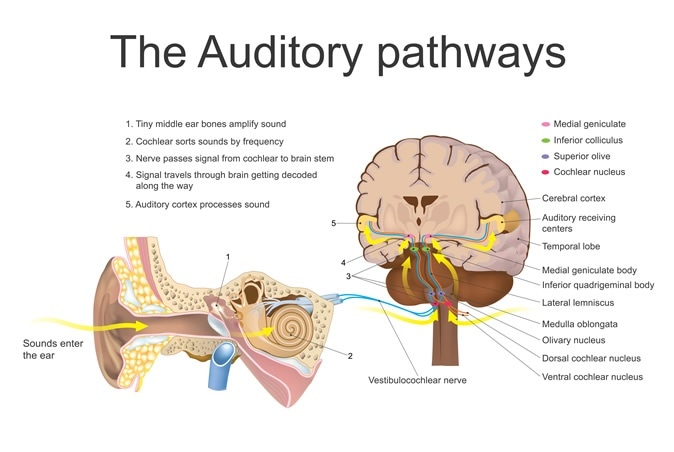Dr Ananya Mandal, MD
When a word is being emphasized upon during speech, we tend to raise our pitch. Studies of voice modulation and intonations have shown that the pitch can change the meaning of the word. So, it is not always what is said, but how it is said, find researchers of a new study appearing in the latest issue of Science.
The team of researchers looked at high-density brain recordings of the neurosurgical patients who were also clinically monitored. The areas of the brain associated with speech and sounds called the auditory complex of the brain seemed to light up at the pitch differences they noted. In these areas of the auditory complex, the researchers found highly specialized and dedicated neurons whose job was two decode the pitch differences in speech and the voice modulations. The speech was decoded by these neurons in real time to assess the signals given.
There are other sites of the auditory complex including those that analyze the critical aspects of speech including information about the speaker and the phonemes. Phonemes are distinct units of sounds in any language that allow us to understand one word from another. For example - pat and pad and bat and bad etc. in English language. These sites of the brain that detect pitch modulations are ones that overlap with these specialized other sites as well.
The researchers noted that listener’ brains are constantly trying to glean information from the intonational pitch used in speech. Just like speakers of all human languages are using intonational pitch to convey exact meanings of what they want to convey. This includes emphasizing upon single words. The pitch changes are assessed by the listeners who extract the shape of intonation contours. These intonational contours are independent of each of their known speakers.
The team used high-density electrocorticography that helped them record neural population activity directly from the brain surface. The participants were made to hear sentences that varied in several factors including intonational pitch contour, speaker and phonetic content. Intonational contours were detected by the human superior temporal gyrus area of the brain using single electrodes. These were mixed with and overlapped significantly with the other sites that identified phonetics and speaker identities explained the researchers. The participants were 10 epilepsy patients who were awaiting surgery. They all had an electrode placed inside their brains to help the doctors detect the source of their seizures.

The auditory system is the sensory system for the sense of hearing. It includes both the sensory organs (the ears) and the auditory parts of the sensory system. Image Credit: Artwork studio BKK / Shutterstock
Dr. Eddie Chang, a professor of neurological surgery at the University of California, San Francisco explained that this study found that there were groups of neurons that processed only the pitch of the voice. He added that these neurons helped identify the “melody of speech” or the intonation of the pitch rather than just the vowels and consonants. Chang added that intonation was how one says things and how it is said can change the meaning completely without changing the words itself. One of the commonest examples of this is that by raising the pitch of the voice at the end of a sentence alone, a statement can be converted into a question. The participants were made to hear a statement such as “Reindeer are a visual animal.” Sometimes the sentence began on a higher pitch ending at a low making it a statement and sometimes it began at a lower pitch and ended at a higher pitch making it a question.
The study was conducted by Claire Tang, a graduate student in Chang's lab and the Science paper's lead author who looked at the brain imaging studies.